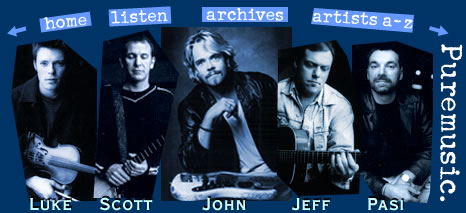
A CONVERSATION WITH JOHN COWAN (continued)
PM: How about a word on some of your guys. [Banjo player] Scott Vestal is an amazing character.
JC: He grew up listening to Bela Fleck the way a serious horn player would have worshipped Charlie Parker. But he definitely has his own voice. He's a very soulful player. Scott grew up in Oklahoma and Texas, and he's kind of a redneck. I don't mean he's a racist or anything. Bela grew up in NYC, in a very cultured environment. His mom is a writer, his dad is a cellist. Scott's got an Oklahoma funk on him, like J.J. Cale, and that makes him by nature a very different kind of character and player, though Bela was his biggest influence. It's funny how the different regions of our country turn out players of a flavor, of a kind. The Tulsa guys have their thing, and the Memphis guys, like that. There's something spooky about that.
PM: Not just the players, but the songwriters, right? That's always been one of my favorite things to observe in Nashville. The Louisiana people write like this, and the North Carolina ones do it like that...
JC: And all the Texas guys have their own stroke, Townes and Guy and Steve, and all that.
PM: How about your drummer, Pasi Leppikangas, what's his story?
JC: He's a Canadian, go figure. He's basically a hard rock/fusion drummer. He could play in Metallica or Spirogyra.
PM: How'd you find him?
JC: Scott Vestal, the banjo player, brought him in. Everybody in the band came in through Scott.
PM: Including [new fiddle player] Luke Bulla?
JC: Yeah, Luke's just 21. He played in Ricky Skaggs' Kentucky Thunder for a couple of years, and he grew up in the Northwest. He was part of a band with his parents and sister called The Bullas. He's a championship fiddler, won Weiser [Idaho] and the Grand Masters, he's a real wunderkind.
PM: Ricky Skaggs is certainly famous for finding the young prodigies, Bill Monroe-style. I just saw him play for that taping of the Bluegrass Celebration for PBS, and he had these two young flatpickers that were frightening. Pretty close set eyes, fingers like pistons.
You know what I like, too, is that your band sounded a lot different on your record than they did backing up Drew Emmitt on Freedom Ride. That's a good trick.
JC: Well, you know, different music, different enough.
PM: I think one way that your music is different from that is the way you lean. Bluegrass, no less than jazz now, has become synonymous with pushing the envelope in various directions, and the way you push is toward rock. [There is a cover of the famous Yes song on their new CD, "Long Distance Runaround."] Is that distinguishing characteristic a conscious thing?
JC: I don't think so. It's just what I cut my teeth on, you know. Until I joined Newgrass, I played in bands that did Little Feat and Allman Brothers and Yes, stuff like that. When I was really young, and you're the same age as me, when I was learning to play bass, I went out and bought "Knock On Wood." I can remember that Stax 45 in my hand with the blue green label, and putting it on. Learning to play "Knock On Wood" with Duck Dunn on the bass.
PM: That's funny. I remember my two brothers and I getting rid of a drummer who couldn't play "Knock On Wood" when I was 14.
JC: So, as a player, and certainly as a singer, my energy and roots come from that place. Not just rock & roll, but soul and R&B. I mean, I love Bill Monroe. But I wasn't about to sing like that, it would have been an affectation. So I just sing like I sing naturally. For me, it's all about Stevie Wonder and Mavis Staples. And Aretha, those are the people I sat and listened to for hours and hours.
PM: And one can certainly hear all that in every note you sing. Do you still do tons of session work?
JC: I don't do tons of it, I really don't.
PM: Did you at one time, or is it a more steady or even occasional thing?
JC: It's kind of a trickling thing, really. I think that one of the reasons I don't is that, although I know how to blend vocally and sound anonymous, people usually call me because they want me to do me, you know? So, for better or for worse, that's usually how it's worked.
PM: Doesn't Travis Tritt use you regularly, for example?
JC: Yeah, you'll find me on his records.
PM: So, you seem to be really working it this summer, a lot of dates. How's it going out there, and what's the timbre of the project, as it were? continue
print (PDF) listen to clips puremusic home